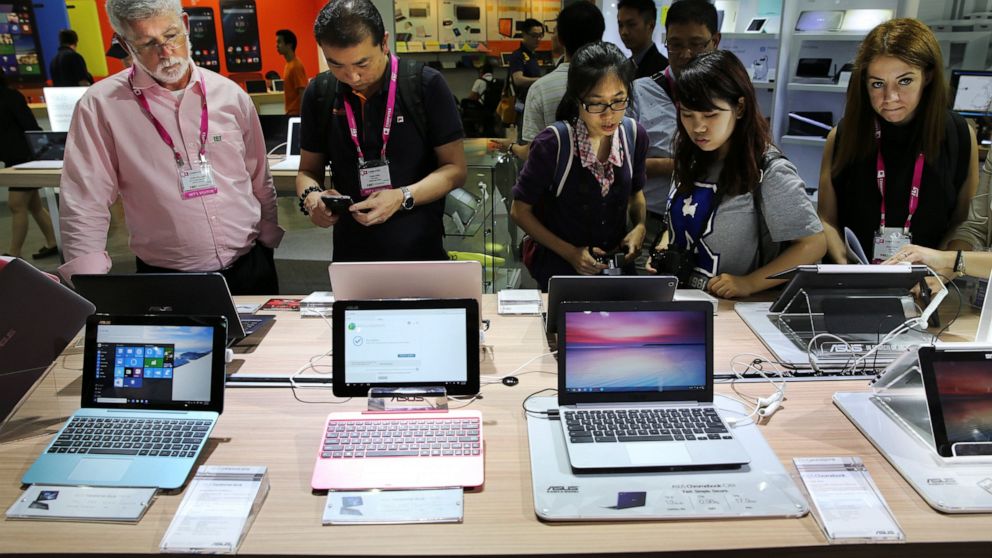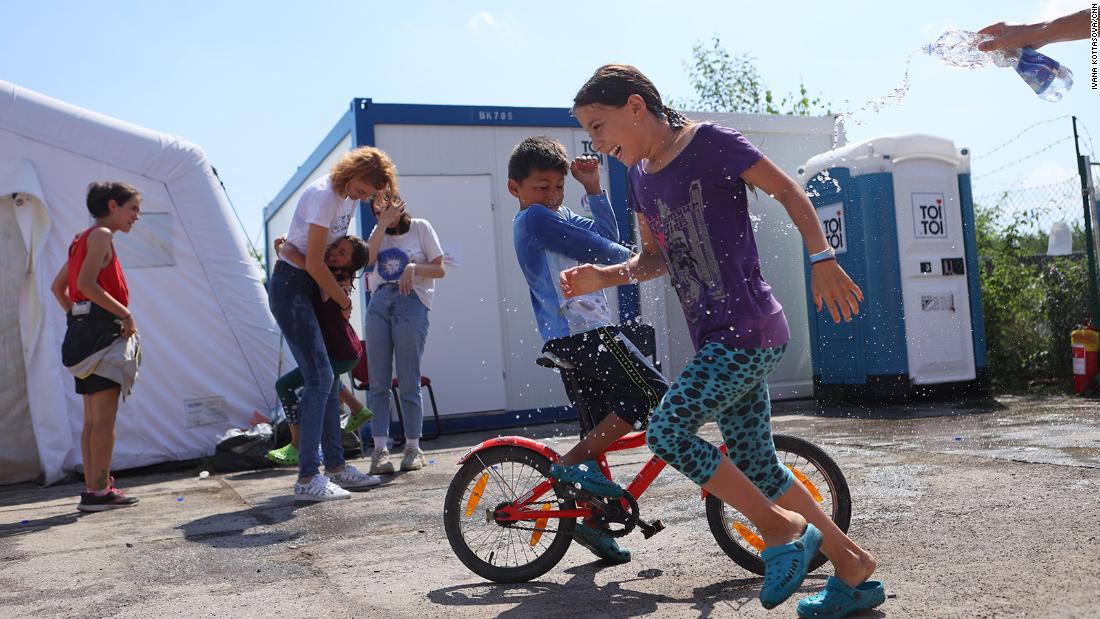Instead, they found themselves behind a barbed wire fence in a repurposed immigration detention center that was, she says, dirty and full of strangers, some of whom were aggressive towards her and her children.
Baloh, a Roma woman, was shipped off to the prison-like facility alongside other mostly Roma families, while tens of thousands of other Ukrainian refugees found places to stay in private homes and dormitories in the Czech Republic.
"It was like a prison. It was bad. I was afraid there, there were so many people, many scary people," she told CNN.
Hers is a common story, according to NGOs and activists.
"Roma refugees are automatically placed into non-standard accommodation," says Patrik Priesol, head of the Ukraine program at Romodrom, a Czech NGO focused on Roma rights and advocacy. "It is very saddening and I am not afraid to say it amounts to institutional racism and segregation."
The Czech Republic has received more than 400,000 refugees from Ukraine since Russian President Vladimir Putin ordered a full scale invasion of the country in late February. The Czech government has passed an
EU-wide law that allows refugees fleeing Ukraine to apply for temporary protection status, access health care and start working in the bloc.
In a statement emailed to CNN, the country's police headquarters said ethnicity does not play a role in the application process.
"We are not considering ethnicity of the applicants, only their citizenship," a spokesperson for the Czech Police headquarters told CNN in a statement.
Russia's war on Ukraine has sparked a huge wave of solidarity across Europe, with governments and individuals rushing to offer help to those fleeing the conflict. The UN believes more than
6.3 million Ukrainians have fled their country, although some have since returned.
But the crisis has also exposed an ugly truth: That in many places,
Roma people are simply not welcome.
CNN visited shelters and spoke to a number of refugees, social workers and activists in the Czech Republic, Romania and Moldova. In all three countries, the problems Roma refugees face are uncannily similar.
Roma refugees from Ukraine are routinely accused of not being Ukrainian; they are segregated in low quality accommodation. According to several NGOs, many are given misleading information about their rights; and issues that are easily solved when faced by others who've fled Ukraine -- such as missing passport stamps -- are often used as a reason for them to be turned away.
Reports by rights groups from
Poland,
Slovakia and
Hungary suggest such discrimination is common across eastern Europe.
Romanian Roma rights campaigner Nicu Dumitru told CNN the refugee crisis had shone a light on the kind of hostility Roma people still face in Europe.
"Being discriminatory against Black people or gay people is becoming less acceptable in Europe, or at least people restrain themselves from doing this in public. That's not the case with Roma, which is probably the last group of people that is still fine to discriminate against in Europe," he told CNN.
Roma communities have faced persecution and discrimination in Europe ever since they first came to the continent from India hundreds of years ago, and were persecuted during the Holocaust.
Roughly 90% live below the poverty line, according to the European Union Agency for Fundamental Human Rights.
Dumitru works for Aresel, a Bucharest-based Roma civic education initiative that turned its focus to refugees fleeing Ukraine earlier this year after receiving multiple reports of discrimination.
He said one watershed moment for the organization came in April when a large group of Roma refugees complained about being denied humanitarian meals at a help point in Bucharest. "They were kicked out because they were 'too many' and 'too loud' and people would say, 'You're not Ukrainian, you're Roma, go away,'" Dumitru said.
ADRA, the group distributing the meals, told CNN the incident, which was caught on camera, had been "taken out of context and led to the idea of discrimination and intolerance against Roma people." It said the Roma group had been turned away because it was made up mostly of men but was in an area reserved for mothers and children, and added it has zero tolerance for discrimination of any kind. "The group left the room at the announcement of another person, unaffiliated with ADRA," the ADRA response said, adding that other Roma groups from Ukraine were in the center.
The Bucharest Municipal Emergency Coordination Center told CNN it is providing humanitarian aid "without discrimination" and added it "has not received any reports of discrimination in the provision of aid."
Across the border in Moldova, Roma mediator and journalist Elena Sirbu said she, too, was horrified when she saw what was happening in one of the refugee centers in the Moldovan capital, Chisinau.
Sirbu said she was originally asked by the authorities to help "handle" the situation but instead became an advocate for Roma refugees after witnessing the discrimination first-hand.
"When I saw the ignorance and the attitude ... these people ran away from the war, they come here, it was cold outside, some of the children had no winter shoes, and they asked for a cup of tea or [diapers], and the Moldovan authorities told them to go away, accusing them of not being refugees, and saying 'we want normal people,'" she told CNN. "And this was happening in front of me. How do you think I should act?"
The Moldovan government's Crisis Management Center (CUGC), which is responsible for the shelters, said the shelters are required to "comply with the principle of non-discrimination in all stages of service provision and promote and respect human rights, regardless of race, skin color, nationality, ethnicity."
The CUGC "constantly consults with Roma refugees regarding their specific needs," it told CNN, and "imposes measures to combat discriminatory attitudes towards refugees, especially the Roma group."
No home to go back to
Like many Roma refugees, Luiza Baloh and her kids, who range in age from nine months to 11 years, have fallen through the cracks in the system.
She told CNN the Czech detention center which she and her children were sent to was so scary that she decided to leave. The family ended up camping at the main train station in Prague alongside hundreds of others, mostly Roma refugees. She was told by authorities that she was no longer eligible for help, because she had "rejected" the accommodation she had been offered.
Priesol said this was a common scenario and that poor communication was often to blame. "Some of these people are functionally illiterate, they are in a post-traumatic situation, and they are offered a place in a detention facility that is temporarily turned into an accommodation facility, and they are told 'this prison here is your home now,'" he said.
"They don't understand the serious consequences of their decision to decline the offer," he added.
Baloh eventually ended up in one of two makeshift refugee camps in the suburbs of Prague which have since been merged into one.
Camp officials say it's a place to which authorities send people they say aren't eligible for assistance. The Czech government said people who do not receive temporary protection status can stay for a few days and then leave the country.
Conditions at the camp, which CNN was granted access to by the authorities in charge, were basic: Large military-style tents surround a plaza that is partially shaded by gazebos. There are portable toilets and mobile shower units and meals are served three times a day. Most of the residents are Roma and many come from some of the poorest areas of Ukraine.
Nikol Hladikova, the social worker in charge of the camp, is the head of the humanitarian department at Prague's Social Services Center, a municipal agency. She has been involved in the refugee crisis response since the beginning and corroborated Baloh's account of conditions in the detention facilities.
"My first visit to one of them, we came with a bus full of refugees and I turned the bus back because the situation there was absolutely horrendous," she told CNN. "There was dirt and excrement everywhere, there was no kettle to boil water and we had a one-month-old baby with us."
Hladikova said conditions at the facility had improved after she and her colleagues raised concerns about them.
Segregation 'is not intentional', authorities say
Lida Kalyshinko fled her home in the Odesa region, near the Ukraine-Moldova border, with her family after the war broke out. She, her daughter and two granddaughters have spent the last three months in an abandoned university building in Chisinau that has been turned into a refugee shelter.
The building houses more than 100 refugees, almost all of them Roma. The few that are not Roma are mostly citizens of central and western Asian post-Soviet countries, including Tajikistan and Azerbaijan.
A single drinking water tap serves the entire building and discarded furniture clutters the dark corridors where small children roam. At the time of CNN's visit in mid-July, several Covid-19 cases had been reported among the residents.
Standing outside the large, grey building, Kalyshinko pointed to a mobile shower unit provided by UNICEF. The facility was of little use to her granddaughter, who uses a wheelchair, she said. "She has only taken a shower four times since coming here, because it's so difficult to get her there, there are so many steps and the showers can't be used by disabled people."
The Moldovan government's Crisis Management Center (CUGC), which is responsible for the shelter, told CNN it was trying to make conditions there better, working to bring a hot water supply into the building. Once that is done, shower facilities will be set up on each floor, it said.
In a written response to questions from CNN, the CUGC denied intentionally segregating Roma refugees in the shelter, saying that they had been placed there to avoid breaking up "large families of ethnic Roma, who could not be separated in different placement centers" at a time when large numbers of refugees were coming into the country.
Moldova is one of the poorest countries in Europe and as such has limited capacity to deal with the refugee crisis. More than 550,000 people have crossed from Ukraine into the nation of 2.6 million since the beginning of the war. The vast majority have already left for other, wealthier European countries, but around 88,000 remain according to the UN refugee agency, UNHCR.
Ala Valentinovna Saviena says she too would like to leave Moldova. The 49-year-old told CNN she left her hometown, Odesa, in late February hoping to join relatives in Germany. But her 19-year-old son doesn't have a passport or other form of ID, which makes a trip to a European Union country extremely difficult.
Moldova, which is not part of the EU, changed its entry requirements for undocumented people fleeing Ukraine after the war started, but those who want to continue on into the EU face more bureaucracy.
It's a common issue faced by Ukrainian Roma. "We have 5,000 Roma refugees staying in Moldova and a lot of them don't have documents, maybe 30%," Sirbu said. "We tried to work with the [Ukrainian] embassy but it's not possible to get new documents there," she said.
Ukrainian authorities have set up special help points near the border where people can request new documents, but a trip across the border and back is out of reach for many who've already fled.
The added complication in Saviena's son's case is his age: As a man over the age of 18, he may not be allowed to leave Ukraine again if he returns. The rule requiring most men age 18 to 60 to remain in Ukraine to defend the country was not tightly enforced at the beginning of the war but is now. Saviena said her son was allowed to leave Ukraine by walking through a humanitarian corridor.
Activists said Ukrainian Roma wanting to come to Europe are also victims of intentional misinformation, including misleading guidance about the documents they need.
"They talk on Facebook and there's a lot of disinformation -- so if it says you cannot go to Romania without a biometric passport, they believe it and they don't come even if it's not true," Lucian Gheorghiu, Dumitru's colleague at Aresel, told CNN.
Lengthy bureaucracy
But even those who do have the correct documents aren't guaranteed a warm welcome. Roma refugees across Europe have been subjected to lengthy background checks that are supposed to determine whether they are eligible for protection, according to reports from several activist groups.
Vit Rakusan, the Czech Interior Minister, said in May that such checks were necessary because of "mostly Roma refugees" who held Hungarian as well as Ukrainian citizenship and were coming to the Czech Republic to exploit the benefits system.
Veronika Dvorska from Iniciativa Hlavak, a volunteer group that helps refugees arriving at the main train station in Prague, said the vetting process can take as long as 10 days.
"We'd send people to the registration center and they would come back to us after being told they needed to be checked. In our experience, these were mostly, if not exclusively, Roma refugees," she told CNN. "I have no reports of non-minority refugees ever coming back."
At the height of the crisis in May, as many as 500 people were sheltering at the train station waiting for the checks, according to Dvorska.
The Czech government framed the dual citizenship of Roma refugees as a major issue, even sending a special diplomatic letter to the Hungarian government, according to a statement by the Ministry of Interior.
But there is very little evidence that it was ever a widespread problem. The Czech Ministry of the Interior told CNN the police had conducted 7,100 checks and found 335 instances of people holding dual citizenship. It said there were 201 people with Hungarian citizenship and 66 with Polish citizenship. The rest held citizenships of number of other EU countries.
But Hladikova and Priesol point out that many of the Ukrainian Roma who also hold Hungarian passports were given Hungarian citizenship as part of Prime Minister Viktor Orban's controversial decade-long policy of handing out passports to ethnic Hungarians living abroad.
"We all criticized Orban's regime for this, we all protested against it, we knew that it put people into a legal trap and now we are using it to our advantage. It's a pinnacle of hypocrisy," Priesol said.
The Czech government also announced in a statement in May that, in order to crack down on people "who are not running away from the war," it would reject anyone who did not have an EU entry stamp in their passport.
Dvorska and Priesol each said the rule only seemed to be applied to Roma refugees; others who don't have the stamp are offered other ways of showing that they were living in Ukraine when the war broke out, they said.
Separately, the Czech government said it would not accept applications for temporary protection status, an EU measure, from people who have applied for protection in a different EU country -- even if they have since canceled their status there.
The European Commission dismissed both of these statements, saying they were not in line with European law. Responding to questions from CNN, the Commission said EU member states cannot deny the status to people who don't currently have protection status in another EU state and said "the existence or non-existence of an entry stamp is not relevant" in the process.
Asked about the discrepancy between the EU guidance and the Czech approach, a spokesperson for the Interior Ministry reiterated that under the Czech laws, people who have canceled their protection status in another EU country were not eligible for it in the Czech Republic.
Priesol said the seemingly arbitrary rules are all part of the Czech government's strategy to deter people from applying for a visa. "The authorities are creating hurdles in the process on purpose and this atmosphere is creating a very uncomfortable environment," he said.
The Czech interior ministry said the applications are handled by "experienced police officers who are able to detect irregularities during interviews."
"But it's a reflection of the mood in society and the unwillingness to integrate Roma people -- anti-Roma sentiment is so high in the Czech Republic that there is very little opposition to this treatment of people," Priesol added.
First time in school
Baloh told CNN that, like several dozen others in the Prague camp, she would like to stay in the Czech Republic long term, since she doesn't have a home to go back to.
"I would like my children to go to school. I'd like to work. I had a job in Ukraine, I was a cleaner in a restaurant," she told CNN.
Hladikova said her department was trying to find longer term accommodation for those people who would like to stay and integrate into the Czech society. It's a process that takes time and a lot of patience -- most of the camp's residents can't read or write and cultural differences persist.
"I have known some of these families since April and I can see how much improvement they've made and it's unbelievable. Especially the children, they are like sponges, they absorb new things so quickly ... but this is not something [outsiders] can see," she said.
"Unfortunately, there are many people who don't even get here. They are stopped at the train station and they are sent back to Ukraine," Hladikova added, saying some of her Roma clients have been turned away from official registration centers and help points.
Hladikova is adamant that her job is to help people like Baloh who want to stay and integrate -- even if other authorities want the family to leave the country as soon as possible.
"We have different goals and a different style. I am here to take care of my clients, help them as much as I can. But for the state, it's expensive, they don't want to do this, it's been going on for a long time," she said.
Her friendly, no-nonsense attitude makes Hladikova extremely popular in the camp she runs. When CNN visited, the children kept coming over to give her a hug; later, as a water fight broke out in the scorching midday heat, she laughed and let the kids spray her with water.
Balokhyna's eldest daughter, 11-year-old Hanna, told CNN she had never been to school before coming to Prague. Now she goes almost every day.
During an improvised math class in one of the tents that day, she was wrestling with the question of 72 + 9. Shifting eight rows of colorful beads to one side, she got stuck for a moment, nervously gazing at one of the volunteer teachers.
Then, with a little help, she figured out the answer, everyone around her smiling as she whispered: "81."
Ana Sârbu contributed reporting.





